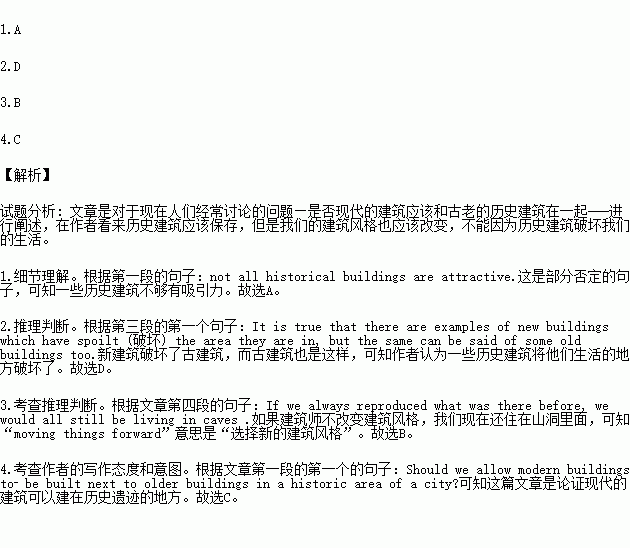题目内容
Should we allow modern buildings to be built next to older buildings in a historic area of a city? In order to answer this question, we must first examine whether people really want to preserve the historic feel of an area. Not all historical buildings are attractive. However, there may be other reasons—for example, economic(经济的) reasons—why they should be preserved. So, let us assume that historical buildings are both attractive and important to the majority of people. What should we do then if a new building is needed?
In my view, new architectural styles can exist perfectly well alongside an older style. Indeed, there are many examples in my own hometown of Tours where modern designs have been placed very successfully next to old buildings. As long as the building in question is pleasing and does not dominate(影响) its surroundings too much, it often improves the attractiveness of the area.
It is true that there are examples of new buildings which have spoilt(破坏) the area they are in, but the same can be said of some old buildings too. Yet people still speak against new buildings in historic areas. I think this is simply because people are naturally conservative(保守的) and do not like change.
Although we have to respect people's feelings as fellow users of the buildings, I believe that it is the duty of the architect and planner to move things forward. If we always reproduced what was there before, we would all still be living in caves. Thus, I would argue against copying previous architectural styles and choose something fresh and different, even though that might be the more risky choice.
1.What does the author say about historical buildings in the first paragraph?
A. Some of them are not attractive.
B. Most of them are too expensive to preserve.
C. They are more pleasing than modern buildings.
D. They have nothing to do with the historic feel of an area.
2.Which of the following is TRUE according to the author?
A. We should reproduce the same old buildings.
B. Buildings should not dominate their surroundings.
C. No one understands why people speak against new buildings.
D. Some old buildings have spoilt the area they are in.
3.By “move things forward”in the last paragraph, the author probably means “_________”.
A. destroy old buildings
B. choose new architectural style
C. put things in a different place
D. respect people's feelings for historical buildings
4.What is the main purpose of the passage?
A. To explain why people dislike change.
B. To warn that we could end up living in caves.
C. To argue that modern buildings can be built in historic areas.
D. To admit how new buildings have ruined their surroundings.


